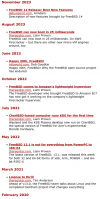I like to supplement your post.
(With 'you' I do not mean you, wolffnx, I mean the general 'you.')
I participate this forum for app. eight years, reading daily, really trying hard not to post
(which for some may a relieve.)
To me it's nearly impossible to be a FreeBSD-user, and not participate this forums.
Every now and then I stumble over very interesting stuff,
sometimes of real value, enhancing my knowledge and experience.
And when I cannot control my urge for more shall stand up for FreeBSD, anymore, I post - trying to be understanding and polite, which produces long posts.
Sorry for that.
But either it's brief, or polite and understanding.
One cannot have both.
(There are some posts about exactly that somewhere here.)
I had decades of bad experiences with Windows, and within Linux-universe.
With FreeBSD I feel the first time having an operating system that's perfect for me.
And I fight for this will not change, especially not become more Windows, nor Linux.
Which I see the need for, when I presume the pro-Linux stuff increases.
\begin{joke}
I wait for someone asks how to get systemd up and running under FreeBSD.
\end{joke}
As it feels to me:
Many Linux-users turn their back on it, of systemd, or for whatever reasons,
which I can understand,
because I never got into love with any Linux
long before systemd for several reasons (long list, you pointed out some.)
Now they are looking for an (almost equal) alternative, find FreeBSD, and join, which is great. Really!
No question.
Then they realize things are different, as they are used to.
But instead of relearn, arrange themselves with the other situation, which presumbly many do, not a few start whining, complaining, asking, why FreeBSD does not become more like Linux, because Linux is so (much) great(er), in one form or the other, often quite subtle.
At least once every two weeks (I do not keep exact count) again a thread like this one, or similar comes up.
They simply trying to do things Linux-style instead of FreeBSD-style, and then ask/complain, why it's not working as they are used to, and if it wasn't better if it changes.
No!
I don't want to change my system, my config, my habits...because they don't want to.
Classics are:
- fully automatic install including pre-configured desktop-environment - NO!
It seems to me I'm not the only one tired to explain it every two weeks over and over again.
There are
several threads here with exactly that topic. No. No! and again
NO!!
I don't want no KDE for the exact same reason you don't want no fvwm, twm, xfce, lxde,....
(With 'you' I do not mean you, wolffnx,I ment the general 'you.' Just to be crystal about that, again.)
- pulling sources from github instead of using the sophisticated, reliable ports-system. Don't complain when there're may occur some inconsistences, and you don't exactly knew what you're doing, and why!
Do a pkg install, for heaven's sake!
RTFM!
If pissed by the Monopoly-club, one does not join the local chess-club, because one may heard being a chess-player was cool, and then asks: "Wouldn't it be better if the pieces were moved by throwing dice?"
No!
You may leave your country because of poverty, and insecureness, because of corruption, and go to another country.
(I myself am an alien in another country.)
Okay.
But what you don't do is, to complain about all the problems and bad things there were, and praise the greatness of all the good things there are in the country you left, only.
Besides you not only piss off the indigenous inhabitants, but much further expose yourself as a moron.
Because one question automatically comes to mind:
"If it's here so bad, and there where you came from so great,
why didn't you stay there in the first place, or simply go back?!"
Most people are aware of nothing is perfect, and there is always room for improvement.
But nobody accepts criticism by a moron.
Nobody needs nor wants additionally the problems from somewhere else,
and especially not being turned into something like that.
[rant-end]
Sorry for that,
but already the title of this thread is a subtle offense against FreeBSD,
because it implies FreeBSD are the bad guys by seperating from Linux.
As I said before FreeBSD 'seperates' the same from Linux, as Linux from FreeBSD, and no-one is bad because of that.
Doing things the own way - which was the core idea to start the FreeBSD-project, as it was the same for Linux - and perhaps add from others by picking carefully, reasonably, and by sophisticated tests only what be a real improvement
and suit the concept, is not a separation at all.
Separation means throwing out, and blocking by principle.
Except for maybe the not to be touched core principles, nothing is blocked. And only obsolete stuff is thrown out.
FreeBSD conjuncts more as I know by any other OS, including Linux.
Just not frantic rushing into any new ideas, but weighing up carefully, is not "old-farts blocking ignorantly" but simply sophisticated, mature, reasonable.
Maybe the bit too quickly and unreasoned rushing into new things is exactly the point why Linux became unattractive for some.
And maybe the conservative, careful way of pushing things forward by reasoning testing is the reason why FreeBSD is so reliable, stable, and attractive.
Maybe.
And maybe there is some understanding why many does not want that to be changed,
and are really sensitive about anything that even remotely smells like it.


